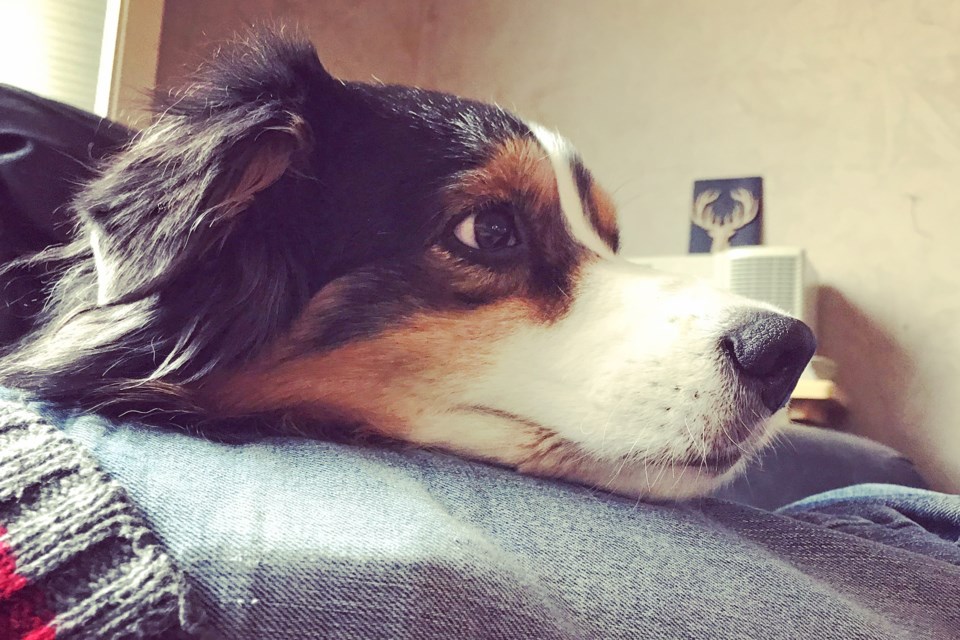Watching your best friend, also known as your pet, have difficulty with aging can be heartbreaking.
The first signs are usually trouble with climbing stairs and lower amounts of playfulness and energy. The later stages are loss of appetite, weight loss and longer periods of sleeping.
How we manage these different stages of animal aging can mean the difference between suffering and sadness, or making your friend as comfortable as you can and making the most of the last experiences that you share with your little loved ones.
Take, for example, Rob Thurrot of Barrie, whose dog Sadie is 17 years old and has had bouts of cancer.
“Sadie was first diagnosed with a soft-tissue sarcoma on her front leg when she was seven. She had it removed through surgery and had about four months rehab," Thurrot tells BarrieToday. "When she was 11, the cancer returned and she had more surgeries to remove it along with 19 rounds of radiation to attempt to kill all remaining micro cells of cancer.
"The diagnosis was that it would give her another four years or so, but she’s now 17 and still has the spirit and generally decent health, although her mobility over the last few months has tapered off which is why she now gets to travel via stroller with her park friends," he says.
When asked about why he undertook the gargantuan effort to go through all the expensive and stressful work to try and cure Sadie, Thurrot says the choice was simple.
“I believe dogs are family as well as companions, so the decision to assist in any health issues is easy," he says. "To the dog, the owners are everything — guardian, teacher, playmate — and reward us with love and loyalty that few other things can. The relationship with your dog should be for all times, not just the good times.”
Cats have aging issues, too, and can suffer from dementia just like humans do. When cats reach the age of 14, they are considered seniors. Some of the symptoms of dementia include lots of yowling for no apparent reason at different times of the day. Going to the bathroom outside of their litter box and lack of interest in playing can be signs of dementia as well.
Dogs also suffer with dementia, and can become disoriented or confused within familiar surroundings, no longer responding to their name when called, and failing to follow common learned commands.
The hardest part of being a pet owner is when it comes time to make end-of-life decisions.
Enter Dr. Laura Coulter, who is a veterinarian with Coulter Veterinary Hospice Services: Heart with Wings, which is based here in Barrie.
“As a practice devoted only to senior, hospice and end-of-life care, we have these conversations multiple times per day with families," she said. "It is really important that we listen to the family and try to understand what their concerns are regarding their pet’s disease and care. As we help them make plans for their pet, it is important that we honour the bond that they share and that we support the bond as the family sees it.
“For families that need guidance in how to proceed with their pet’s care, we sit down with them to discuss their pet’s concerns, prognosis, likely trajectory of the disease and palliative and hospice care options," Coulter added. "Most of the families express that they are fearful that their pet will suffer or worry that there is one right day for end-of-life care and that they won’t know when it has arrived.
"Reassuring the family that they don’t have to make the decision on their own and providing them with tools to measure their pet’s quality of life not only helps to alleviate some of these fears and pressures they feel, but also helps to alleviate the feeling of guilt that so many struggle."
As many of these issues pile up on a pet owner grappling with life with a senior pet, it can be hard to be prepared for the eventual outcomes.
Coulter noted that there are many challenges in caring for a senior pet. Some of the challenges may include the emotional stress, physical and financial challenges.
“I feel that many families are not prepared for the many challenges of caring for a senior pet, and this has been especially highlighted as the veterinary profession deals with severe shortages of veterinarians," the doctor said. "As veterinarians become spread thin, there may not be enough time to walk the family through their pet’s concerns and discuss options for palliation, prognosis and what to expect as their diseases progress.”
Families with senior pets that are beginning to suffer the effects of old age and the related illnesses need to know that there are options out there to help guide them through the tough times, whether it be financial or emotional, or asking for knowledge from an experienced caregiver.
“As a veterinarian that is certified in palliative and hospice care through the International Association of Animal Hospice and Palliative Care (IAAHPC), we routinely have pet owners that call to say that their pet was diagnosed with a terminal illness and they were told that it is time to euthanize," Coulter said. "It is really gratifying when we are able to provide the family with palliative and hospice care options that will improve their pet’s comfort, quality of life and allow them more time with their pet."
For more information on Coulter Veterinary Hospice Services: Heart with Wings, click here.



